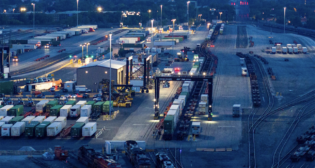
Railroad, Transit Groups Request Vaccine Priority
Written by Marybeth Luczak, Executive EditorFreight rail and transit organizations are requesting that Congress and state governors, respectively, consider their members’ employees as the COVID-19 vaccine is distributed.
The Centers for Disease Control and Prevention’s (CDC) Advisory Committee on Immunization Practices has proposed that essential workers, including transportation workers, be included in the second priority group (Phase 1b) of the vaccine rollout, after health care workers and others who are considered highest priority (Phase 1a).
The American Short Line and Regional Railroad Association (ASLRRA) joined the Association of American Railroads (AAR) and nine other groups in submitting a letter Dec. 9 to senators on the Commerce, Science and Transportation Committee and Transportation and Safety Subcommittee requesting “timely access” to the vaccine. (Download letter below.)
They wrote:
“This Committee demonstrated significant leadership at the onset of the pandemic by convening a hearing to examine the impact of COVID-19 on surface transportation and the supply chain. Proactive steps taken by the Committee have addressed the needs of workers supporting our nation’s freight transportation network. Just as these focused efforts were necessary to support distribution of personal protective equipment (PPE) to the dedicated professionals who ensure the continuity of our domestic supply chain, it is imperative that this Committee now focus its efforts to ensure that these same critical infrastructure workers have access to the COVID-19 vaccine as it becomes available.
“The [CDC] has advised that COVID-19 will remain an unremitting public health concern for months to come. As a result, the importance of a risk-based vaccine distribution plan cannot be overstated. Ensuring vaccine availability for freight, rail, port and waterway, and energy workers is a key protective intervention to help keep our critical supply chains operating, reinforce the resilience of our transportation networks, and mitigate the risk of economic downturns and their effects at the local, regional, and national levels. As we saw at the outset of the pandemic, when supply lines are disrupted, consequences are fast to follow.
“Earlier this month, the CDC Advisory Committee on Immunization Practices met concerning the phased allocation of COVID-19 vaccines. The Advisory Committee recognized the importance of essential critical infrastructure workers, such as employees, contractors, and suppliers in our industries, and proposed that they be included in a ‘Phase 1b’ vaccine sequence. … We respectfully ask the Committee to support this projected allocation of COVID-19 vaccines.”
Along with ASLRRA and AAR, the other groups that signed the letter are: American Association of Port Authorities; American Trucking Associations; American Waterways Operators; Inland Rivers, Ports & Terminals; Interstate Natural Gas Association of America; National Association of Waterfront Employers; National Maritime Safety Association; National Tank Truck Carriers; and Truckload Carriers Association.
DOWNLOAD THE LETTER:
Additionally, the American Public Transportation Association (APTA) has written to all state governors “urging them to consider prioritizing transit workers as they develop their vaccination distribution plans,” Vice President-Policy and Mobility Arthur L. Guzzetti told Railway Age. (Download a letter below.)
APTA’s letters, signed by President and CEO Paul P. Skoutelas and dated Dec. 8, explained:
“We are heartened by the progress on the development and deployment of the COVID-19 vaccine. We urge you to designate public transportation workers as essential employees in your state’s public health plan and give them high priority in your vaccine distribution efforts.
“Since the early days of the pandemic, public transportation has played a critical role in transporting essential frontline workers to their jobs in health care, education, utilities and retail for food and critical supplies. Our public transit employees have been heroes moving heroes. Public transit service will be even more critical to the recovery of local, state and national economies.
“At the national level, we are pleased that the Advisory Committee on Immunization Practices, which is advising the Centers for Disease Control, proposed that essential workers (including transportation workers) be included in the second priority group after health care workers.
“In addition, public transit workers providing critical transit services and performing critical or routine maintenance have been designated by the Department of Homeland Security’s Cybersecurity and Infrastructure Security Agency (DHS/CISA) as Essential Critical Infrastructure Workers. Their performance of critical functions places them at higher risk of exposure to COVID-19 infection.”
DOWNLOAD ONE OF THE LETTERS:
The Railway Supply Institute (RSI) issued the following statement from Nicole Brewin, Vice President of Government and Public Affairs, encouraging railway suppliers to be included in early recipient groups of the COVID-19 vaccine:
“Throughout the pandemic, railway supply workers across the country have provided essential services to support our passenger and freight railroads as they deliver people, food, fuel, medicine, and other supplies that have sustained our nation’s pandemic response and economic recovery. Many of these 125,000 workers have been identified by the Department of Homeland Security as part of the essential critical infrastructure workforce and continue to put themselves at greater risk in order to keep our critical manufacturing and transportation services operational.
“Today, we submitted comments to the Centers for Disease Control and the Advisory Committee on Immunization Practices (ACIP) urging the Advisory Committee to consider railway suppliers in the Phase 1B distribution of the vaccine. The availability of a vaccine for these workers would significantly enhance this industry’s ability to perform its duty to maintain the essential rail supply chain and provide services to support critical rail operations while also ensuring the health, safety, and well-being of our workers and the residents of the communities in which we live and work.”
Download the RSI comments:



